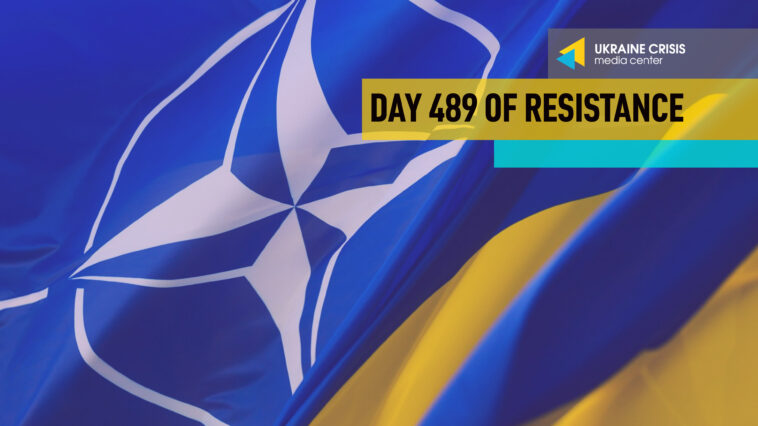Ukraine prepares for the NATO summit in Vilnius. Ukrainian troops advance on all axes. Putin’s response to Prigozhin’s mutiny.
Ukraine prepares for NATO summit in Vilnius
President Zelenskyi said there is every reason for Ukraine to receive a political invitation to join NATO at next month’s summit meeting. On Tuesday, June 27, he held a meeting with his team ahead of the NATO summit in Vilnius, he said on Telegram.
“NATO. Vilnius. Ukraine. There is every reason for a political invitation for Ukraine to join the Alliance. There is a full understanding of the security guarantees for Ukraine until the moment of accession,” Zelenskyi said. “We are working with the team to make the decisions of the Vilnius Summit truly meaningful,” he added.
Vilnius will host the NATO summit on July 11-12. Ukraine expects to receive a clear signal to join the Alliance at the summit.
Ukrainian troops advance on all axes
On June 26, Ukrainian troops advanced on all axes, Ukrainian President Zelenskyi said. “Today, the frontline: Donetsk and Zaporizhzhia regions. Our warriors, our frontline positions, areas of intense operations on the front lines. Today, our warriors have advanced in all directions, and this is a happy day. I wished the guys more days like this,” Zelenskyi said in his nightly address.
Ukraine has reclaimed more territory as part of their summer campaign than Russia did in its whole winter offensive, UK Defence Secretary Ben Wallace said, speaking to the House of Commons on June 26. He said Ukraine had already recaptured approximately 300 square kilometers.
Ukrainian troops have not yet entered Bakhmut. They continue to advance on the Bakhmut axis and on the flanks, Ukraine’s Deputy Defense Minister Hanna Malyar said. Ukrainian offensive operations along this front are in their fourth day. Ukrainian troops are making “gradual, but steady” progress on the flanks every day, she added.
“In Bakhmut and on its outskirts, there is a vast system of engineering fortifications and strongholds. Ukrainian troops and the local government built them for defensive purposes, and they helped maintain defense positions for so long. These fortifications and strongholds were captured by the enemy. We need more efforts and patience to liberate the area,” Malyar said.
Putin’s response to Prigozhin’s mutiny, latest developments
When Putin addressed the nation on June 26, he continued to denounce the organizers of the armed rebellion as traitors. Putin did not name Prigozhin specifically. He said Wagner fighters who seek to continue “serving Russia” can sign a contract with the Russian Ministry of Defense, retire and go home, or go to Belarus. Putin’s spokesperson Dmitry Peskov earlier said the address would change the future of Russia.
Putin offered to forgive and integrate Wagner forces – which indicates his need for trained and effective manpower, the Institute for the Study of War (ISW) said in a report. Belarus will not offer Prigozhin or Wagner fighters a true haven, it added.
Prigozhin’s efforts to convince Putin of his loyalty clearly failed as Putin characterized the armed rebellion as a blackmail attempt and denounced its organizers as traitors following Prigozhin’s statement, the Institute for the Study of War said. Putin’s June 26 speech likely signaled a decisive break between Prigozhin and Putin, and it is likely that the Kremlin will attempt to replace the Wagner leader to distance the PMC (private military contractor) from Prigozhin’s betrayal – if the Kremlin decides to keep Wagner as a distinct entity. Putin emphasized that Russian forces and officials conducted all necessary measures to avoid bloodshed under his “direct orders,” which undermines Prigozhin’s claims that Wagner decided to deescalate the situation, the ISW added.
Russian authorities have closed the mutiny probe into the Wagner Group. The Russian Security Service (FSB) said the mutiny’s participants “stopped their actions aimed at committing a rebellion”.
The Wagner group’s mutiny shattered the myth of Putin’s presidency as one that embodies stability and power. Russia’s political and business elites are now questioning Putin’s ability to withstand the blow. Some say that the search for Putin’s successor is already underway.
Cities that no longer exist part 2. Ukraine in Flames #473
Volnovakha and Popasna, once thriving Ukrainian towns, have been devastated by Russia’s war and destruction. These towns have seen the worst of the Russian army, having been on the front lines not only during the full-scale invasion but since 2014, and our speakers say they couldn’t have imagined the level of destruction they have suffered. For those eastern towns that have been deoccupied, rebuilding efforts are underway, focusing on restoring businesses, attracting entrepreneurs, and regaining the pre-war population. In UIF #473, episode of Ukraine in flames we take a further look into the cities that have been devastated by Russia’s war.
Guests:
- Pavlo Yeshtohin, Volnovakha, journalist
- Nikolay Khanatov, head of the Popasna city military-civilian administration
- Yulia Kanzeba from Popasna (Ukrainian City)




